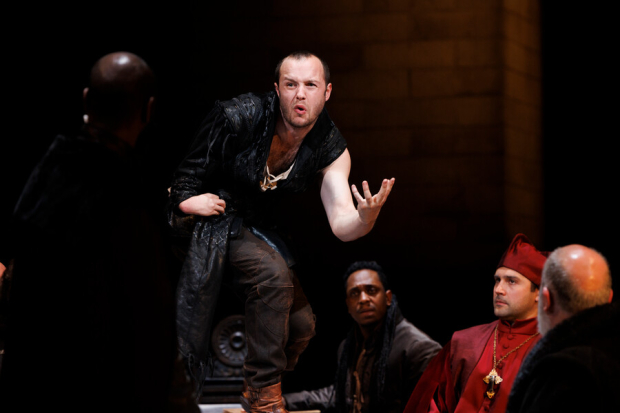Richard III at the RSC – review

©RSC/Ellie Kurttz
An unlikely, morally bankrupt schemer, bereft of empathy and surrounded by sycophantic hypocrites, climbs to the top of the political greasy pole, only to find himself fatally exposed by his own narcissism and ineptitude.
It's easy to see why Shakespeare is timeless.
This RSC production marks the penultimate play in the company's ten-year journey to stage all of the First Folio ahead of the quatercentenary of its publication next year. Only All's Well That Ends Well remains, to be produced later in the summer. Outgoing artistic director Gregory Doran helms this clamorous offering, which completes a trilogy that was begun with two Henry VI plays, retitled Rebellion and Wars of the Roses.
Like those productions, there is plenty to enjoy in this straightforward, uncomplicated retelling of Shakespeare's twisted history. Much has been made of the casting of Arthur Hughes in the title role, the first disabled actor in the RSC's history to tackle what is perhaps the greatest disabled character ever written. In the end, his physicality becomes almost irrelevant to his performance, which delivers on his promise from the Henrys to present a Richard whose paranoia consumes and overwhelms his ambition.
At times the tone, like that of the production itself, veers towards overly frenetic and intense, but ultimately it all stays the right side of irritating – although the 110-minute first half could certainly stand a little trimming. But there are some genuinely theatrical moments, including a beautifully created Battle of Bosworth in which the ghosts of Richard's victims are transformed into a majestic steed, the loss of which prompts his most famous line.
Designer Stephen Brimson Lewis and composer Paul Englishby add much to the dramatic success. The space is almost entirely empty except for a huge cenotaph upstage centre, and Matt Daw's lighting generates much of the atmosphere. Lewis's costumes are essentially traditional, in keeping with the aesthetic, and it looks magnificent. From the ghosts' eerie incarnation to the extraordinary grey locks of Minnie Gale's extraordinary, vengeful Queen Margaret, every detail is carefully placed.
There are performances to match, too, with Jamie Wilkes's Cummings – sorry, Buckingham – chief among the devious dukes manoeuvring for position around the branches of the Houses of York and Lancaster. Ben Hall, Simon Coates and Micah Balfour all make for strong courtiers, while it can surely only be a coincidence that Nicholas Armfield's Earl of Richmond, opposing Richard on the battlefield, bears a passing resemblance and manner to Keir Starmer.
In a play in which so much metaphorical violence is done to the female characters, it's a testament to the storytelling that the four wronged queens provide the emotional core of the production. As well as the aforementioned Gale, Claire Benedict imbues Richard's mother with a steely horror at her creation, while Rosie Sheehy's Lady Anne offers some rationale behind the character's bizarre decisions. Kirsty Bushell, meanwhile, combines genuine pathos with righteous fury as the mother of the murdered princes in the tower.
Individually they are powerful; together they're invincible.












